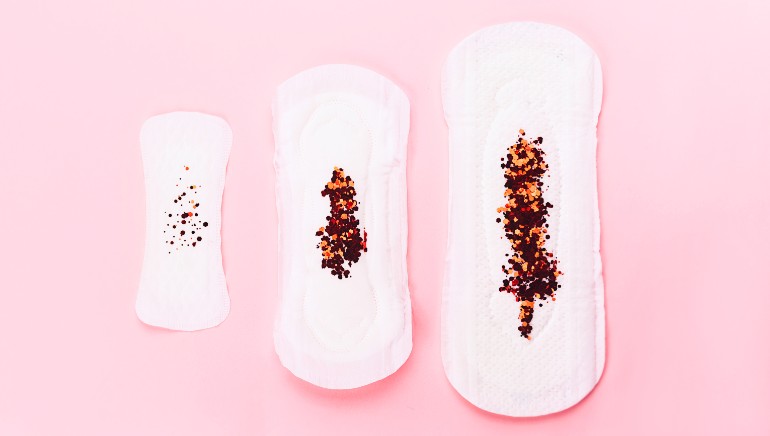Have you ever wondered why your period has that distinct metallic smell? You’re not alone. Many women have experienced this phenomenon and have questioned what it means for their health. The truth is, a metallic odor during your period is usually nothing to worry about. In fact, it’s quite common and can be attributed to the presence of iron in menstrual blood. In this article, we’ll delve into the science behind why your period smells like metal and explore the various factors that can contribute to this unique scent.
Contents
Why Does Period Blood Smell Like Metal?

When it comes to that metallic smell you may notice during your period, it all comes down to the presence of blood. Blood contains iron, which can give off a metallic odor. So, when we talk about why your period smells metallic, we’re essentially talking about why blood smells metallic.
During your menstrual cycle, the shedding of the uterine lining releases blood mixed with tissue. This combination of blood and tissue can result in a different smell compared to blood from a cut or wound. It’s important to note that this is usually a normal occurrence and nothing to be concerned about.
The pH of the vagina also plays a role in the smell of period blood. A normal vaginal pH ranges from 3.8 to 4.5, which is acidic. The presence of blood, semen, or urine in the vagina can affect the pH and contribute to different odors. So, a slight metallic smell from iron and bacteria may be expected during a “healthy” period.
It’s worth mentioning that occasional spotting or vaginal bleeding caused by sex can also lead to a metallic odor between periods. However, if you experience bleeding between periods or during or after sex, it’s always a good idea to consult with your healthcare provider to rule out any underlying causes.
The metallic smell associated with period blood is typically due to the presence of iron. It’s a normal occurrence during your menstrual cycle and is influenced by the pH of the vagina. Remember, if you have any concerns about unusual odors or changes in your menstrual cycle, it’s best to seek advice from a healthcare professional.
Should I Worry if my Period Blood Smells Metallic?

Causes For Vaginal Metallic Odor
There are several reasons why your period blood may have a metallic smell. Here are some common causes to consider:
- Iron Content: Menstrual blood contains iron, which can give it a metallic odor. This is completely normal and nothing to be concerned about.
- Menstrual Flow: If you have a heavy period, the blood may stay in the uterus longer, allowing more time for the iron to oxidize and create a stronger metallic scent.
- Dehydration: When you’re dehydrated, your urine becomes more concentrated, which can affect the pH balance of your vagina. This can result in a stronger metallic odor during your period.
- Vaginal pH: The pH of the vagina is typically acidic, which helps maintain a healthy balance of bacteria. However, certain factors like hormonal changes or infections can disrupt this balance and cause a change in odor.
- Infection: In some cases, a metallic odor during your period could be a sign of an infection, such as bacterial vaginosis or a sexually transmitted infection (STI). If you experience other symptoms like itching, burning, or unusual discharge, it’s important to consult a healthcare provider for further evaluation.
When to Seek Medical Attention
While a metallic odor during your period is usually normal, there are instances when it’s important to seek medical attention. Consider the following:
- Persistent Change: If you notice a sudden and persistent change in the smell of your period blood, it’s worth discussing with your healthcare provider. They can help determine if there’s an underlying issue causing the change.
- Unusual Symptoms: If you experience other unusual symptoms alongside the metallic odor, such as severe pain, heavy bleeding, or fever, it’s important to seek medical attention promptly.
- Recurring Infections: If you frequently experience abnormal odors or recurrent infections, it may be a sign of an underlying condition that requires medical treatment.
Remember, it’s always better to be safe than sorry when it comes to your health. If you have any concerns or questions about the odor of your period blood, don’t hesitate to reach out to your healthcare provider for guidance and support.
Tips to Reduce Metallic Period Blood Smell
If you’re concerned about the metallic smell of your period blood, there are a few simple steps you can take to help reduce the odor. Here are some tips to consider:
- Maintain good hygiene: Keeping your vaginal area clean during your period is essential. Make sure to change your sanitary products regularly, at least every 4-6 hours, to prevent the buildup of bacteria and odor. Additionally, washing the area with mild, unscented soap and warm water can help maintain freshness.
- Stay hydrated: Drinking an adequate amount of water throughout the day can help dilute the concentration of your menstrual blood, reducing the intensity of the metallic smell. Aim for at least 8 glasses of water a day to stay hydrated.
- Consider your diet: Certain foods can impact the odor of your menstrual blood. Avoiding strong-smelling foods, such as garlic and onions, during your period may help minimize any unpleasant smells. Instead, opt for a diet rich in fruits, vegetables, and whole grains to promote a healthier vaginal pH.
- Practice good vaginal health: Maintaining a healthy vaginal pH can help prevent the overgrowth of bacteria that can lead to an unpleasant odor. Avoid using scented products or douches, as they can disrupt the natural balance of bacteria in the vagina. Instead, opt for gentle, pH-balanced intimate washes or simply rinse with water.
Remember, it’s important to note that a slight metallic smell during your period is normal. However, if you experience persistent changes in odor, unusual symptoms, or recurring infections, it’s always best to consult with a healthcare professional. They can help determine the underlying cause and provide appropriate treatment if needed.
So, by following these simple tips, you can help reduce the metallic smell of your period blood and feel more comfortable during your menstrual cycle.
When to Seek Medical Attention

If you notice persistent changes in the smell of your period, experience unusual symptoms, or have recurring infections, it’s important to seek medical attention. While a metallic smell during your period is usually normal, there are certain signs that may indicate a more serious underlying issue. Here are some situations where you should consider reaching out to your healthcare provider:
- Foul or fishy odor: If the smell of your period blood becomes extremely unpleasant or resembles a strong fishy odor, it could be a sign of an infection, such as bacterial vaginosis or a sexually transmitted infection (STI) like trichomoniasis. These infections require medical treatment, so it’s crucial to consult your doctor.
- Persistent changes: If the metallic smell persists beyond your period or if there are significant changes in the odor that are unrelated to your menstrual cycle, it could be a sign of an underlying health issue. Conditions like cervical or uterine cancer, endometrial hyperplasia, or hormonal imbalances can sometimes cause changes in the smell of your period blood.
- Accompanying symptoms: Pay attention to any additional symptoms that accompany the metallic smell. Symptoms like excessive pain, abnormal bleeding, itching, burning, or unusual discharge should not be ignored. These could be indicators of an infection, hormonal imbalance, or other gynecological conditions that require medical intervention.
- Recurring infections: If you experience recurring infections, such as yeast infections or bacterial vaginosis, it’s important to consult your healthcare provider. Chronic infections can disrupt the natural balance of the vagina and may require further investigation and treatment.
Remember, it’s always better to be safe and consult a healthcare professional if you have any concerns about the smell of your period. They can properly diagnose and treat any underlying issues, ensuring your reproductive health is well taken care of.
Conclusion
Experiencing a metallic smell during your period is generally normal and nothing to be overly concerned about. Factors like a heavy flow or dehydration can contribute to this scent, as can the pH level of the vagina. However, if you notice persistent changes in the smell, unusual symptoms, or recurring infections, it’s crucial to seek medical attention. Foul or fishy odors, ongoing changes in smell, accompanying symptoms, and recurrent infections may indicate a more serious underlying issue that requires consultation with a healthcare professional. Remember, it’s always better to err on the side of caution and reach out to a medical expert if you have any concerns regarding the odor of your period.
Frequently Asked Questions
Why does my period blood smell weird?
Period blood stays in the vagina for a longer period of time and is exposed to vaginal bacteria, which can cause a different odor. The amount of bacteria in the vagina fluctuates, which can change the smell.
What should period blood smell like?
“Healthy” periods can have a slight smell of blood and may even have a slight metallic smell from iron and bacteria. Generally, period odors aren’t noticeable to others and good hygiene practices can help combat normal period odors.
Why do I smell a metallic blood smell?
People with a heightened sense of smell may detect a metallic scent from blood on the skin, as blood contains iron and other minerals. Washing hands with soap and water can often eliminate the metallic smell.
Does period blood smell coppery?
Due to the presence of blood and iron, a healthy menstrual flow may have a coppery scent. However, the scent of period blood can vary due to the vagina’s acidic environment and naturally occurring bacteria.
Can others smell my period?
It is unlikely that others will be able to detect the smell of your period blood. While you may be able to notice the smell, the chances of someone else smelling your period are slim.
I am a medical student with experience and interest in Women’s health and well-being.